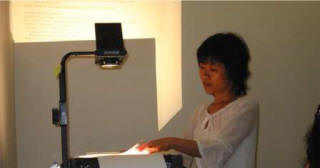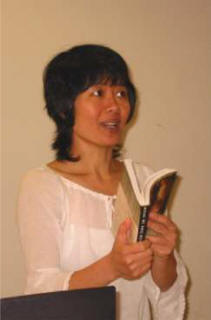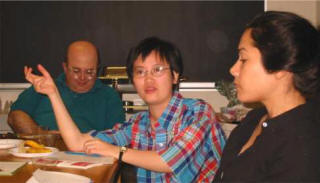
Beginning with a quote by Michel Foucault, Prof. Tricia Lin explained how transnation and translation were used as cultural survival strategies. The audience asked questions that explored the issue of post-colonial island literature and its impact.
“We are in the epoch of simultaneity: we are in the epoch of juxtaposition, the epoch of the near and far, of the side-by-side, of the dispersed.”
–Michel Foucault
“Culture as a strategy of survival is both transnational and translational.”
–Homi Bhabha
“In woman, personal history blends together with the history of all women, as well as national and world history.”
–Helene Cixous
1 Michel Foucault, “Of Other Spaces” (“Des Espaces autres”), trans. Jay Miskowiec, Diacritics Spring 1986: 22.
2 Homi Bhabha, “Post Colonial Criticism,” Redrawing the Boundaries: the Transformation of English and American Literary Studies, eds. Stephen Greenblatt and Giles Gunn (New York:MLA, 1992), 438.
3 Helene Cixous, “Le rire de la medua,” Signs (Summer 1976); anthologized in New French Feminisms (245-64), 252-53.

Vatu Invocation
Heavenly Father
omnipresent
in London
Paris
and Canberra.
Look down
with mercy
upon us
your naive
and gullible servants
doomed
to the colonial legacy of
watching
passively from the periphery
our prime resources
raped
for the gratification of
corporate greed
and
individual
pleasure seekers.
Give us
this day
divine guidance
in our choice
of tourists
technical advisors
investors
and entrepreneurs.
We pray
that those expatriates
will provide
the atmosphere
in which
our aspirations
can
flourish
but not sway us
by their influence
nor ram their policies
down our throats
as they have done.
Grant that we may receive
HIGH CLASS tourists
who will appreciate
our cultural diversity
our primitive grotesque artifacts
and revel in
the unadulterated beauty
of our virgin bushes
and natural environment.
Lead
our young men and women
not
into the temptation
of prostituting
their bodies
for the tourist market
particularly
in the Hotel Industry
as has inevitably
happened
in more developed countries.
Almighty father
endow us with the
strength and tenacity
to uphold
the spirit
and the letter
of our Constitution
so the land and economic
experts
do not water it down.
We beseech you
dear God
to bestow
upon us
the wisdom
to discern
fact from fiction
gift from bribe
knowledgeability
from verbal diarrhea!
This
we ask you
heavenly father
in the name of Burns Philp
Air Vanutau
and the Tourist Authority.
– Grace Mira Molisa, Vanuatu

Colonization
I.
Our own people
say, “Hawaiian
at heart.” Makes
me sick to hear
how easily
genealogy flows
away. Two thousand
years of wise
creation bestowed
for a smile
on resident non
natives.
“Form of survival,”
this thoughtless inclusion.
Taking in
foreigners and friends.
Dismissing history
with a servant’s
grin.
II.
Hawaiian at heart:
nothing said
about loss
violence, death
by hundreds of thousands.
Hawaiian at heart:
a whole people
accustomed
to prostitution
selling identity
for nickels
and dimes
in the whorehouses
of tourism.
III.
Hawaiian at heart:
why no “Japanese
at heart?”
How about
“haole at heart?”
Ruling classes
living off
natives
first
land
then
women
now
hearts
cut out
by our own
familiar hand.
Note: In contemporary Hawaii, the phrase “Hawaiian at heart” is used by Hawaiians and non-Hawaiians alike to identify no-Hawaiians thought to believe and practice Hawaiian cultural values like aloha ‘aina–love of the land–and aloha–a familial love and caring.
This phrase has been used by the mammoth tourist industry to lure visitors to Hawaii and to congratulate those who return. The two groups who control Hawaii’s land and politics–the Japanese and the haole (white)–consciously use “Hawaiian at heart” to describe their actions in the hopes of conveying some relationship to the land. In reality, the phrase is a cultural theft.

